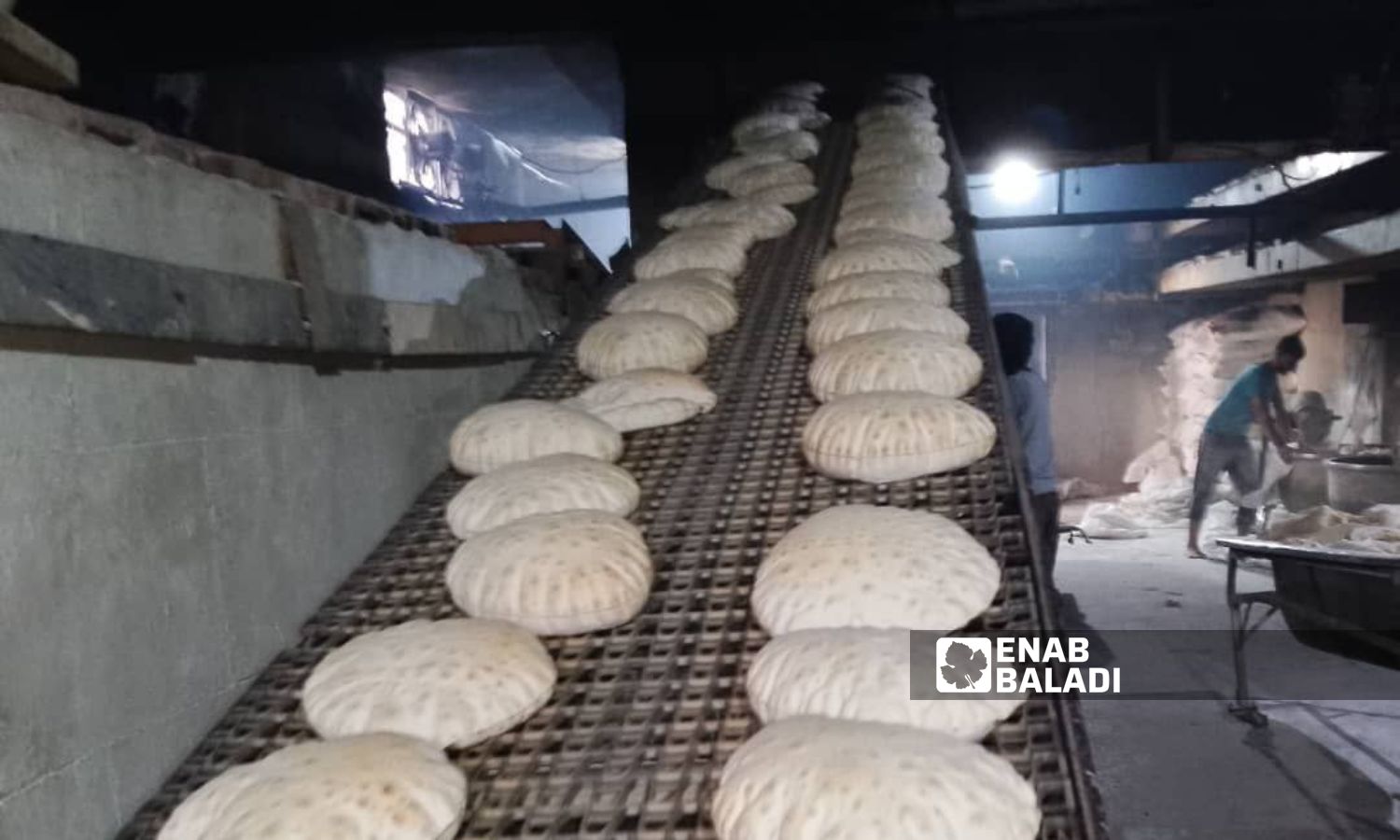



Ismael, a resident of eastern Daraa countryside, pays 700 Syrian pounds for a bundle of subsidized bread, despite its pricing by the Ministry of Trade and Consumer Protection at 400 Syrian pounds for every 14 loaves weighing 2200 grams.
Ismael (40 years old) said that the citizens in Daraa are forced to accept the imposed price by the authorized sellers because the alternative is to buy bread at its unsubsidized price, which reaches up to 7000 pounds for each bundle (14 loaves).
Ismael considered that the owners of bakeries and authorized sellers are taking advantage of the residents’ need to buy subsidized bread after the price hike of unsubsidized bread.
On the other hand, Ali (43 years old), a resident of western Daraa countryside, told Enab Baladi that the price of subsidized bread is only on paper, and the prevailing price at bakeries and authorized sellers is 700 Syrian pounds.
He added that he has a family of eight members and needs three bundles daily, and the high price burdens him financially.
Bakery owners and authorized sellers do not adhere to the prices set by governmental authorities, as observed by Enab Baladi in different areas of Daraa governorate, where bread is sold at a higher price and with less weight than officially specified.
On November 6, the regime’s Ministry of Internal Trade and Consumer Protection issued a decision specifying the price of a bundle of bread (seven loaves) weighing 1100 grams for those excluded from government support and their allocated quantity at a price of 3000 Syrian pounds instead of 1250 Syrian pounds.
The US dollar is trading at 14,200 Syrian pounds according to the S-P Today website, which covers the trading rate of the Syrian pound to the dollar. At the start of the conflict in 2011, the dollar was trading at 47 pounds.
Authorized sellers and bakery owners in Daraa said that the reason for the increase in bread prices is due to additional costs.
The owner of a private bakery in western Daraa countryside told Enab Baladi that the Directorate of Mills delivers flour to them at its center in Daraa city, which means that they have to bear the cost of transporting flour, which varies depending on the distance of the bakery from the city center.
Transportation fares in Daraa have witnessed an increase due to the rise in diesel prices in the province, as the price of a liter of diesel reached 14,000 Syrian pounds in the local market.
The Directorate of Mills sells a ton of flour at a subsidized price of 96,000 Syrian pounds, while the cost of transporting it to reach the bakery in the Yarmouk Basin is about 60,000 Syrian pounds, making the cost per ton 156,000 Syrian pounds, according to the bakery owner.
The bakery owner also added that he bears the cost of bags, yeast, and salt, in addition to the increased wages of the workers and the cost of transporting the bread from the bakery to the authorized sellers.
He explained that the authorized seller needs a car to transport the bread to his shop, so he raises the price of the bundle to cover the transportation costs.
Mohammed al-Asaad, an authorized bread seller in Daraa city, told Enab Baladi that the transportation fees of bread force the bakery owner to raise the price, in addition to a specified profit margin for the authorized seller.
He added that the Daraa bakery sends a car to every three authorized sellers, and in al-Kashef neighborhood, one of the largest neighborhoods in Daraa city, there are ten authorized sellers.
According to the bakery owner, the Ministry of Internal Trade and Consumer Protection determined a profit of 25 Syrian pounds for each bundle for the authorized seller. However, the authorized seller does not accept less than 150 Syrian pounds as profit per bundle.
The issue is not limited to the rise in bread prices, as bakeries manipulate the weight of the loaf, and the weight of the bundle (14 loaves) reaches less than 1500 grams in several bakeries within Daraa province (it is supposed to be 2200 grams).
Hussein (25 years old), a resident of the town of Tel Shihab in western rural Daraa, told Enab Baladi that the weight of the bundle does not exceed 1500 grams.
Similarly, Ismael said that the weight of the bundle does not exceed 1500 grams, and this reduction has made the distributed quantities according to the allocations insufficient for the residents, which pushes them to buy bread from stalls at its unsubsidized price.
One of the local dignitaries of western Daraa countryside said that bakeries manipulate weight and price, and the supply control is almost absent, and the official prices and weights have not been implemented since the Syrian regime took control of the area in July 2018.
Since the beginning of December, the supply control authority has recorded seven violations against seven bakeries in Daraa province, according to the state-run Syrian Arab News Agency (SANA).
The number of automatic bakeries affiliated with the Bread Branch in Daraa is six automatic bakeries, which include eight production lines distributed in Daraa city, Nawa, Busra, al-Sanamayn, Izra, and Jassim. Meanwhile, the number of private bakeries in Daraa province is 117 bakeries.
if you think the article contain wrong information or you have additional details Send Correction